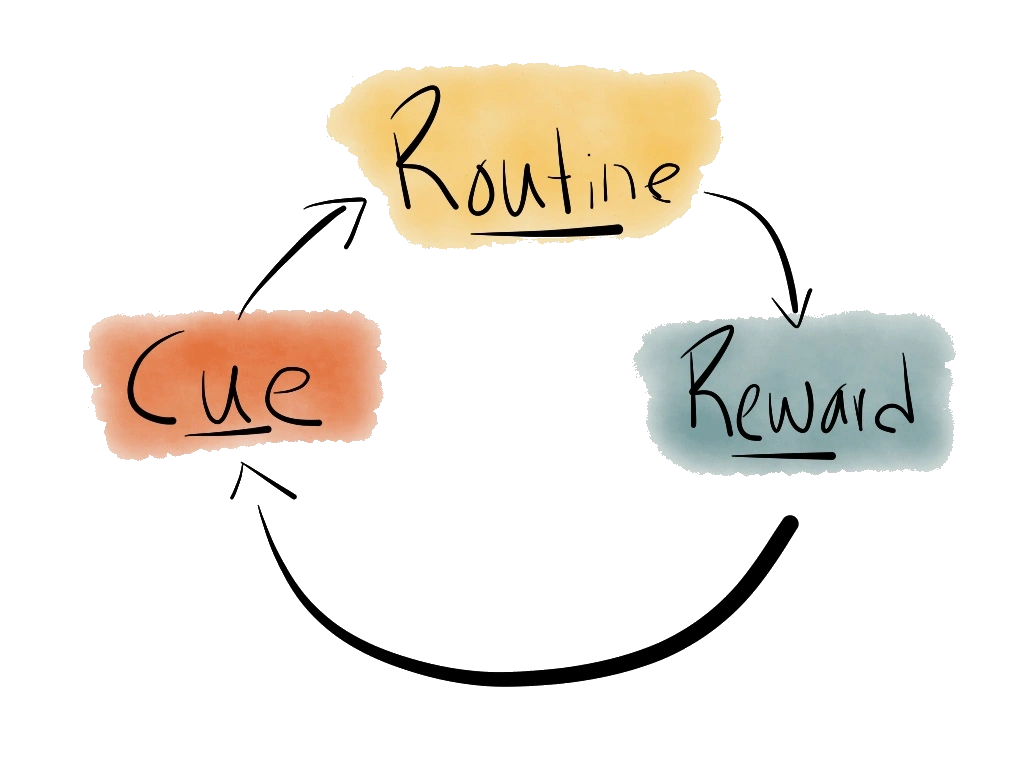
Habit! The word we've been listening to since childhood. We were told to put as much attention as we could to develop the "Right" habits. Why? Is it really important to get the "Right" habits inculcated during our forming years? What is the importance of habit in our personal & professional lives? Can we change our habits? If yes, then how?
These are the questions that this book, written by Charles Duhigg, tries to answer for you. Below is my interpretation of the book -
1. Habits of individual
1. The basal ganglia stored habits even while the rest of the brain
goes to sleep. Outer layers of brain are activated for recent information
processing. Deeper layers store the old memories
2. This activity in which the brain converts a sequence of actions
into an automatic routine is known as "chunking". We rely on a lot of
chunks. E.g. Brushing our teeth to reversing our car. Technically, our brain is auto
configured for productivity initiatives to save effort
3. Habit chunks stay encoded in our brains and wait for the right cue
to be triggered again. This is why every McDonald's looks the same and routines
of customer service are set. These all provide the cue to our habit loop
4. How to initiate new habits - find a simple obvious cue and then
clearly define the reward. Pepsodent was marketed at a simple cue of film
around teeth ( naturally occurring phenomenon irrespective of using toothpaste)
5. The habit is engrained when it creates the neurological craving
of reward just after the cue. E.g. The cue to check emails/messages during a
meeting is the vibration/visual alert on screen. The brain starts expecting a
momentary disruption and we crave for checking it just in case. However, if we
disable alerts we eliminate the cue, thereby making meetings more productive!
6. To change a habit you must keep the old cue, and deliver the old
reward, but insert a new routine. E.g. Alcoholics Anonymous and Tony Dungy (coach of a rags to riches football story - Google it)
7. To bring about a transformation, the only thing that is a must
is belief. Some people get it via personal tragedies. Others via groups. Social
proof is a big stimulator of belief in people
2. Habits of organisations
1. You can't order people to change. You need to start disrupting
habits around one thing and watch the ripples across. Such habits are called
keystone habits
2. Keystone habits start a process that, over time, transforms everything
3. Individuals have habits, groups have routines. E.g. NASA
deliberately overhauled themselves by instituting org routines that encouraged
engineers to take more risks. When unmanned rockets exploded on takeoff,
department heads would applaud so that everyone knew despite failing, they at
least tried. Eventually, everyone applauded when something expensive blew up!
4. To identify a keystone habit, you need to find 'small win'
5. Along with small wins, you need to create a structure that
simply enables other habits to flourish. E.g. Keeping a food journal
6. Willpower is limited. The more you exercise it, the stronger it
gets. Starbucks has created an entire program around creating habits that help
people improve their customer service as they have stronger willpower. It has a
workbook where people are asked to imagine unpleasant situations and write what
they'll do if it happens? LATTE method (listen, acknowledge, take action, thank
and explain why it occurred)
7. Some habit changes occur after a crisis unknowingly. Companies
aren't families. They're battlefields in a civil war. Divisions compete for
resources and sabotage each other to steal glory. Bosses put their subordinates
against each other so that no one can mount a coup. It is these routines & consequent truces that
help organisations sail through peacefully year after year
8. The brain craves familiarity. We all do the same for things we
don't spend much mental energy on. Like music, food
3. Habits of societies
1. People have no problem ignoring a stranger's injury but when a
friend/acquaintance is insulted, the outrage is enough to overcome the inertia
2. These weak ties are the reason how small protests become big
movements
3. Sleep and wake are not mutually exclusive. The part of brain
that monitors behavior is asleep, parts capable of complex activities is
awake. There is then nothing guiding your brain except for your most basic
patterns and habits
Do share your views/feedback in the comments section

No comments:
Post a Comment